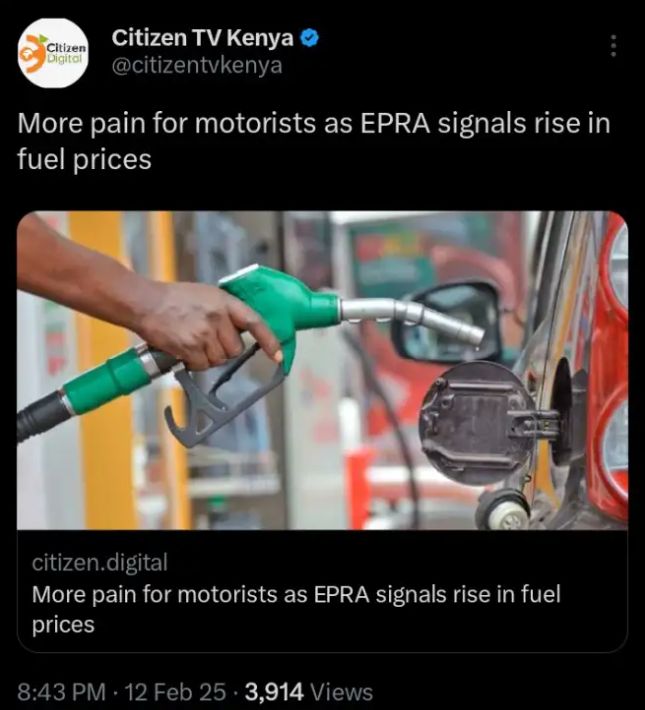Motorists in Kenya are about to face tough times as fuel prices are expected to rise again. The Energy and Petroleum Regulatory Authority (EPRA) has hinted at an increase in fuel costs, which will make transport and daily expenses even higher.
This news comes at a time when many Kenyans are already struggling with the high cost of living.
According to a report by Citizen TV on X, EPRA reviews fuel prices every month based on global oil prices, exchange rates, and local taxes. The global crude oil prices have been increasing, and the Kenyan shilling has continued to weaken against the US dollar.
This makes it more expensive to import fuel. Additionally, the government has imposed heavy taxes on fuel, which further drives up the cost for consumers.
When fuel prices go up, transport costs rise immediately. Matatu and bus operators always pass these extra costs to passengers by increasing fares.

Workers, students, and businesspeople who rely on public transport are the most affected. Those who own private vehicles also find themselves spending more on fuel, making it harder to manage their monthly budgets.
The increase in fuel prices also affects food prices. Farmers and traders transport goods using fuel-powered vehicles, and when transport becomes expensive, the cost of food and other essential products goes up.
This puts more pressure on ordinary Kenyans, who are already struggling to afford basic needs.
Electricity bills are also expected to go up since Kenya generates part of its electricity using diesel-powered plants.
Higher fuel prices mean that power production costs increase, which in turn leads to higher electricity bills for households and businesses.
This affects industries and small businesses that depend on electricity for their daily operations.
Factories and businesses that use fuel in their production processes also feel the impact.
The increase in costs forces them to raise the prices of goods and services to cover their expenses. This makes life even more difficult for consumers who now have to spend more on almost everything.
Many Kenyans and business leaders have urged the government to look for solutions to bring down fuel prices. Some have suggested reducing taxes on fuel or finding cheaper sources of oil.
However, the government heavily depends on fuel taxes to collect revenue, making it unlikely that taxes will be reduced.With the rising cost of living, Kenyans may have to find ways to cope with the situation.
Some people are turning to bicycles or carpooling to save on transport costs. Businesses are also looking for ways to cut expenses to avoid passing high costs to customers.
EPRA will soon announce the new fuel prices, and many Kenyans hope that the increase will not be too high.
However, going by the global trends, it seems fuel prices may continue rising, making life even harder for motorists and ordinary citizens.

